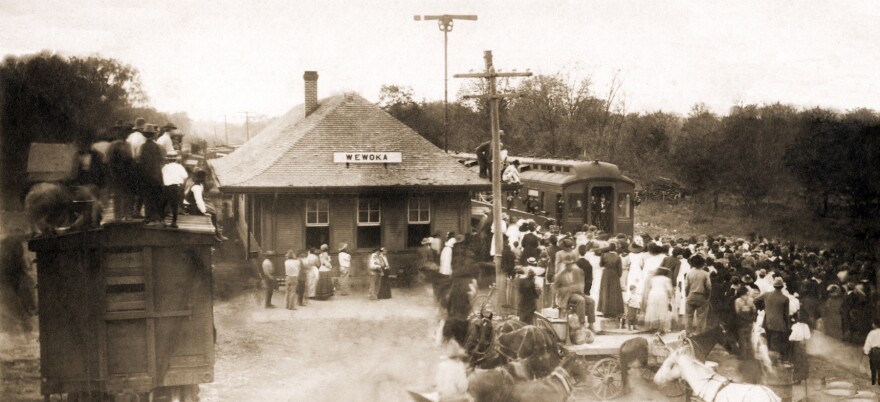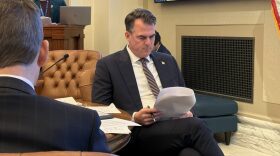Frank Baker grew up hearing his family members use a specific expression. If something was messed up or shady, they would say it was "worse than a Wewoka switch."
He asked "How Curious:" Where did this slang come from? And what is a "Wewoka switch?"
FULL EPISODE TRANSCRIPT:
Claire Donnelly: Frank Baker grew up in Oklahoma.
Frank Baker: My father was born in 1907 and he was the youngest of his family. And so he had older brothers who were born in the late 1800s.
Donnelly: And when Frank was a kid he loved to listen to his uncles' stories.
Baker: Guys sitting around drinking a little whiskey, smoking cigars. And as a kid, I would just be on the fringe of these, you know, probably half truths, lies and maybe intermingled with a little bit of fact.
Donnelly: Frank's uncles also liked to use a specific turn of phrase.
Baker: If something was really screwed up and/or shady, it would be, you know, "worse than a Wewoka switch" or "hell, that's just like a Wewoka switch!"
Donnelly: So Frank asked "How Curious."
Baker: I think I'd just like to know the truth of the matter: what the Wewoka switch was, and how if it was just something that was in my family. But I swear to goodness I think I've heard it elsewhere throughout the years.
Donnelly: This is "How Curious" from KGOU, exploring your questions about the state we call home. I'm Claire Donnelly. Frank's uncle's name was Carl Baker and he was a railroad guy. Uncle Carl was based in Tulsa but he was always riding on trains to various places which, Frank says, always seemed kind of glamorous.
Baker: He was one of those guys that you would sit around and listen to him talk forever. And it was always in the form of anecdotes. Like, "well, one time this old boy and I got into it," or "we were on a haul up to Kansas City." And he'd talk about sometimes, you know, hooking up the various cars, you know, guys could lose a hand or could lose a leg.
Donnelly: Frank says Uncle Carl was kind of a big dude. And tough.
Baker: I think his nose had been broken a couple of times. And, you know, the ears were a little cauliflower-esque. So I think the gentleman knew some fisticuffs throughout the years.
Donnelly: But back to this phrase: "Worse than a Wewoka switch." What does it have to do with Uncle Carl? And with railroads?
Richard Ellwanger: The Wewoka Switch is a train station here in Wewoka.
Donnelly: I meet Richard Ellwanger at the Seminole Nation Museum in Wewoka. He's the museum's director. Wewoka is a city of about 3400 people in Seminole County in the eastern part of the state. And it used to be a railroad town. The Rock Island Line bought the railroad that runs through here at the turn of the century.
Ellwanger: They laid a lot more tracks that ran from McAlester all the way up to Oklahoma City. And they would transport coal from McAlester through Wewoka on the lines up to Oklahoma City.
Donnelly: Ellwanger says Rock Island built a new Wewoka train depot. And it built what are called switching tracks.
Ellwanger: There were tracks on either side of the depot that would run for a half mile in each direction. And this is where train cars would be unloaded. Which originally was perfectly fine. It was, you know, Wewoka was a very quiet, sleepy town, a couple of thousand people.
Donnelly: But then people flooded into Wewoka during the oil boom in the 1920s. And all of those people needed stuff: stuff to build homes, stuff to build oil derricks.
Ellwanger: Wewoka's switching station was the largest such system between Oklahoma City and Little Rock. So there were millions and millions of tons of things coming into this switching station.
Donnelly: And with all of that stuff, some things got lost.
Ellwanger: You know, if you were waiting to drill a well, you needed your equipment right then and there. And somewhere in hundreds of cars on the side tracks would be what you were looking for.
Donnelly: So someone coined a phrase: "caught in a Wewoka switch." Pretty close to what Frank Baker grew up hearing. It meant you were in a bad situation or a tight spot.
Ellwanger: This became such a problem for the railroad that Rock Island had a stamp made up that said "Search Wewoka Switch." So if you, you know, if you got a complaint that something was lost, well, they would stamp it with the stamp and, you know, move the paperwork on.
Donnelly: So there were lots of valuable things coming in and out of Wewoka. And sometimes, nobody knew where it was. Frank Baker says Uncle Carl's stories made it sound like there might have been some shady dealings.
Baker: Sometimes things were legitimately lost in Wewoka. Other times, people were making some money off things just kind of disappearing down in the railroad yards there. And I got the feeling that it was a well-known secret among railroad guys, you know, in the area that if you would be a little bit of a facilitator you'd get a bit of a kickback.
Donnelly: I put this idea to Richard Ellwanger.
Ellwanger: There are stories--of course, there's always somebody that's industrious--that you could probably grease the skids a little if you maybe shared a little bit of cash with perhaps the engineers, some of the railroad men. If you knew approximately when your train was coming in, your railroad car, they'd keep a lookout for it. And then they would make sure that once it got into the track system, they knew where your goods were.
Donnelly: OK, but what about really shady stuff? Like, was anyone paying railroad guys to "disappear" railcars and the stuff inside them? Ellwanger says it's definitely possible.
Ellwanger: I could very well see that if if you needed materials to build a well, and your stuff wasn't going to come in, but somebody else's did, you know, maybe "hey," maybe for a little money, that could be yours.
Donnelly: Of course, stuff wasn't the only thing traveling through Wewoka. There were passenger trains, too. And in 1948, a presidential candidate.
Jim Howell: I heard Harry Truman speak from the back of a railroad car. Just a campaign speech, how he was going to help America if he was elected.
Donnelly: This is Jim Howell. He graduated from Wewoka High School in 1952. He's an attorney and former Oklahoma state senator. Howell says there's also another definition for the Wewoka switch.
Howell: Back during the boom, the oil field workers played poker at night. And two fellows would get together and they would get a newcomer between them. And they would have their cards marked in such a way that they would get the newcomer's money. If you were the person losing all the money, you were in the middle of the Wewoka switch.
Donnelly: Unfortunately, trains don't run through Wewoka anymore. In the 1950s and 60s, lots of Rock Island branch lines were abandoned. And the Rock Island system closed down in 1980. The old Wewoka depot is now the city's chamber of commerce building. But you can see the remnants of the original train tracks running through the grass near the building. The famous--or infamous?--switching tracks have been mostly covered up. But Jim Howell says be careful playing cards out that way.
Howell: Believe me, I gave up poker in Wewoka after I had an adventure with the Wewoka switch.
Donnelly: That's it for this episode of "How Curious." And this is our last episode for this season, but we're working hard on lots of good stories for next season. If you missed some episodes, or only heard the on air versions, you can listen to the full versions on our website or wherever you get your podcasts. And keep sending us your questions! The "How Curious" email address is curious@kgou.org. The show is a production of KGOU Radio. It's produced by me, Claire Donnelly, and edited by Jacob McCleland.
As a community-supported news organization, KGOU relies on contributions from readers and listeners to fulfill its mission of public service to Oklahoma and beyond. Donate online, or by contacting our Membership department.








